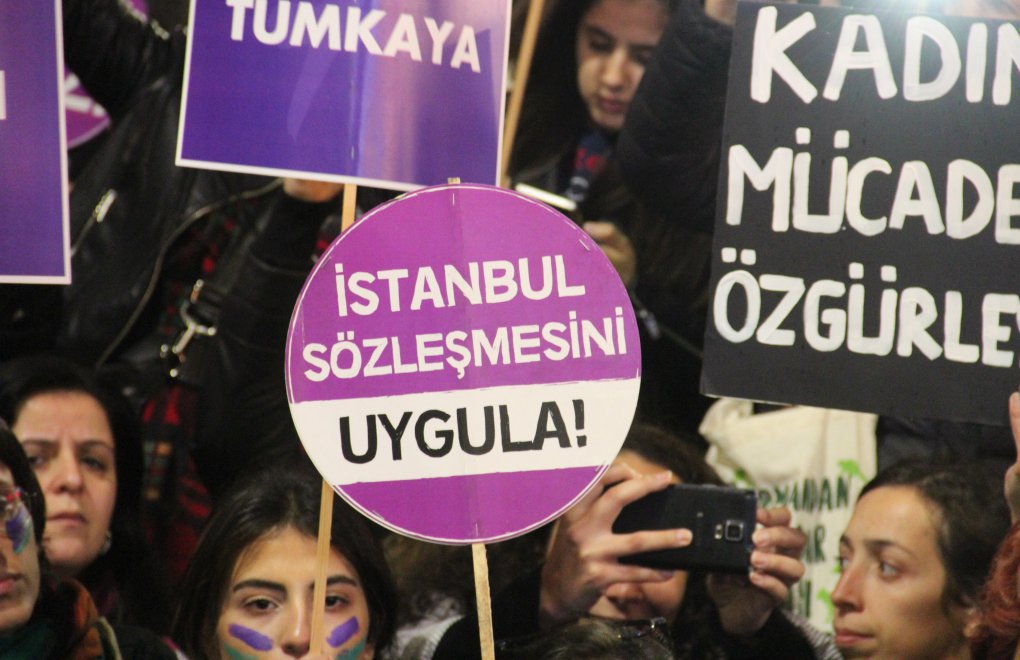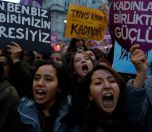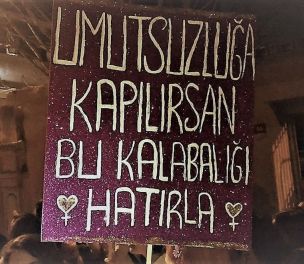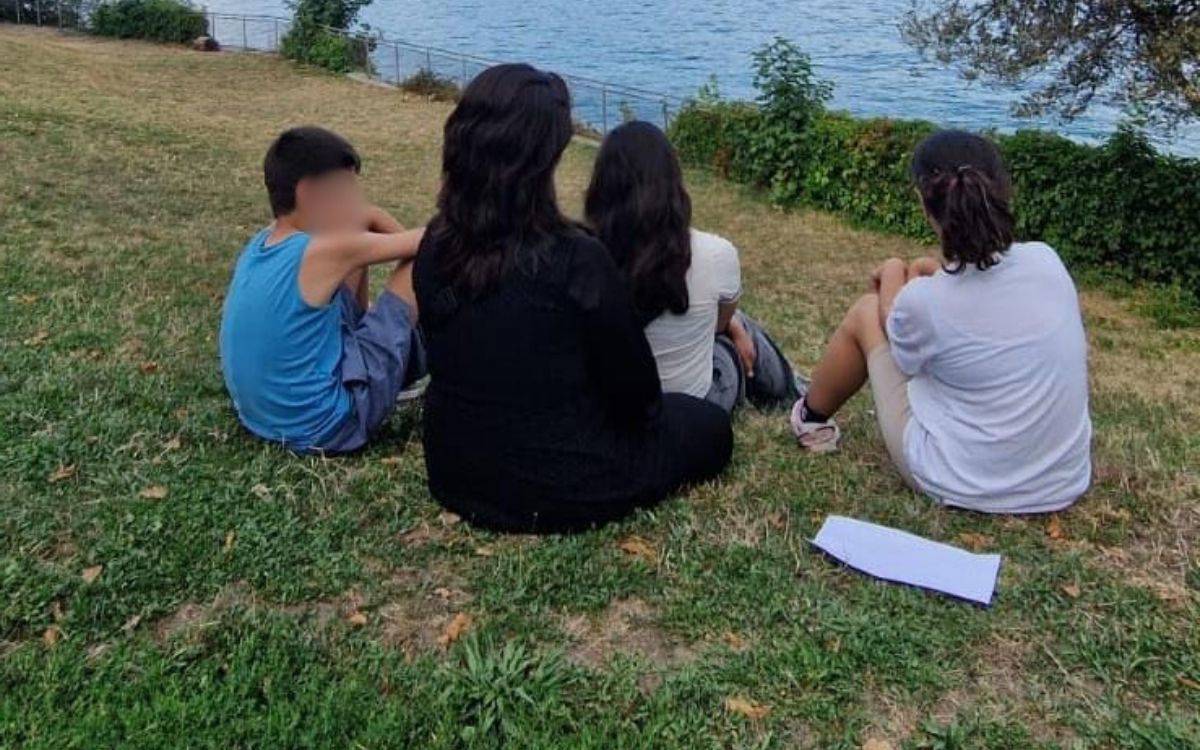* Photo: Evrim Kepenek / bianet - "Implement İstanbul Convention"
Click to read the article in Turkish
"The Article 51 of the İstanbul Convention stipulates that the state shall take the necessary measures to ensure that an assessment of the lethality risk, the seriousness of the situation and the risk of repeated violence is carried out. We lose one more woman when this is not done."
What lawyer Ceren Akkaya from the Purple Roof Women's Shelter Foundation slams is the failure to comply with the İstanbul Convention, whose raison d'être is to prevent male violence and protect women, but which has become a target in Turkey.
Lawyer Akkaya underlines that if the related articles of the convention had been observed, three killed women would be alive today.
Selim Ahmet K. stabbed Zeynep Şenpınar to death in Muğla province on May 24. Shortly afterwards, it has been understood that Zeynep Şenpınar applied to the security directorate for protection from male violence two weeks before her death, but she withdrew the application later on. Selim Ahmet K. has been taken into custody after the murder.
It has been further reported that Ahmet K. was taken into custody for "sexual assault and wilful injury" on August 28, 2019 and released following his deposition at the prosecutor's office. He has 14 offenses in his criminal record, including wilful injury, sexual harassment and assault, aggravated fraud, jeopardizing the traffic and threatening with death.
A man named Şükrü Ş. shot Ceren Kultaş to death with a pump-rifle in Manisa on May 21. He has been arrested.
It is understood that Fatma Günay, whose fate and whereabouts had been unknown since May 23, was killed by her son Aykut G. and their neighbors Ercüment A. and Jülide A. in Edirne. All three suspects have been arrested.
On the other side, in a recent statement released by the Ministry of Interior, it is alleged that while domestic violence and violence against women have been on the increase around the world, feminicides have been decreasing in Turkey. According to the Ministry, when compared with the same period last year, the number of murders caused by male violence has dropped by 26 percent in the first four months of 2020.
Lawyers Ceren Akkaya and Selin Nakıpoğlu from the Purple Roof Women's Shelter Foundation and Aslı Pasinli, the Chair of Women's Rights Center of Diyarbakır Bar, have spoken to bianet about male violence. Noting that male violence will increase amid pandemic, they have underlined that the related institutions of the state turn a blind eye to male violence.
CLICK - bianet Male Violence Monitoring Reports
'Investigation should have proceeded'
Aslı Pasinli: "The fact that Zeynep withdrew her complaint does not mean that she will be protected. On the contrary, an investigation should have been launched against the suspect.
"The Article 55 of the İstanbul Convention stipulates that 'the state shall ensure that investigations into or prosecution of offences shall not be wholly dependant upon a report or complaint filed by a victim, and proceedings may continue even if victim withdraws statement or complaint.'
"In fact, in its judgement on Opuz, the ECtHR concluded that the right to life as guaranteed by the European Convention on Human Rights (ECHR) had been violated on the ground that the state had failed to fulfil its positive liabilities in protecting the life of Nahide Opuz's mother. It also concluded that the article on maltreatment had been violated because the state had been passive about the threats targeting the complainant.
"As we can also see here, there is an emphasis on the absolute liability and due diligence of the state pertaining to women subjected to violence. The complaint withdrawn by Şenpınar should have been examined.
"It needs to be taken into consideration that women are, most of the time, subjected to violence by their family members, close partners and people from their close circle. The feelings of shame, fear and despair and the number of complaints are also to be considered here.
"Even when the complaint is withdrawn, the responsibility of the law enforcement does not end there. They should have carried out an investigation by collecting evidence and examining witness statements and medical evidence. The opposite is negligence."
'What will you do to stop this violence?'
Selin Nakıpoğlu: "We will not stop writing, speaking and expressing our demands until you raise your voice. In the Council of Judges and Prosecutors (HSK) general assembly resolutions dated March 30, 2020, we read that the Law 6284 on the Protection of Family and Prevention of Violence Against Women has been suspended. We have urged them to retract this dangerous and unlawful decision.
"We have indicated that violence against women and children has been on the increase during quarantine, the law enforcement does not answer the phones and the related ministries fail to offer an emergency action plan. And we said it over and over again! It is already May 27 and there is still no word from them. But, there is a gradually increasing violence.
"You have abandoned women and children to their fates in the face of male violence. You cannot get rid of your responsibilities by ignoring violence. I am asking again: What will you do to stop this violence? Moreover, we see that some media outlets and MPs from the ruling party do not abandon their sexist attitudes even in a period like this.
"What does it mean 'she was killed because she wanted freedom'? Have a heart! Fulfil your liabilities arising from the Constitution, instead of finding excuses for the massacres of men and leaving the doors wide open to them. If what you want is the opposite of freedom, question yourselves first."
'What did the state do that violence has decreased'
Ceren Akkaya: "Every day, we hear that women are massacred by men and feel grief. With effective and comprehensive policies of the state, women can be protected from male violence and feminicides can be stopped.
"Most recently, on the [sugar] feast, we heard that Zeynep Şenpınar, who was killed by her ex-boyfriend, made an application because she had been subjected to violence, but she withdrew it later on. The provisions of İstanbul Convention and the Law no. 6284 are quite clear. The Article 51 of the former places liability on the state to assess and manage the risk.
"It means the following: It is understood that the perpetrator who killed Zeynep committed crimes for many times before. While it was obvious that this person was someone inflicting violence and Zeynep even had a restraining order issued against him, the risk of violence to be committed by the perpetrator should have been assessed and Zeynep should have been provided with the necessary protective measures.
"As per the Article 51 of the İstanbul Convention, the state and the related authorities shall take the necessary measures to ensure that an assessment of the lethality risk, the seriousness of the situation and the risk of repeated violence is carried out. We lose one more woman when this is not done.
"In these days of outbreak, when we hear about a new feminicide every day and more and more applications are made to women's organizations about male violence, the Ministry of Interior has announced statistics suggesting that violence against women has been on the decrease. These figures match neither the data from the world nor the applications made to women's organizations. These data should be debated by the public as well.
"I mean, it does not suffice to say that 'violence against women has decreased in the time of outbreak,' the causes and effects of this should also be shared with the public in detail.
"What has the state done that these numbers have dropped? We need to see this and trust the data. Amid this entire picture, we need to reiterate: In struggling against violence against women, the İstanbul Convention and all effective policies need to be implemented and emergency action plans have to be announced to the public."
About İstanbul Convention
* Source: CoE The Council of Europe (CoE) "Convention on Preventing and Combating Violence Against Women and Domestic Violence", also known as "İstanbul Convention", is based on the understanding that violence against women is a form of gender-based violence that is committed against women because they are women. It is the obligation of the state to fully address it in all its forms and to take measures to prevent violence against women, protect its victims and prosecute the perpetrators. As of March 2019, it has been signed by 45 countries and the European Union (EU). On March 12, 2012, Turkey became the first country to ratify the Convention, followed by 33 other countries from 2013 to 2019 (Albania, Andorra, Austria, Belgium, Bosnia and Herzegovina, Croatia, Cyprus, Denmark, Finland, Estonia, France, Georgia, Germany, Greece, Iceland, Ireland, Italy, Luxembourg, Malta, Monaco, Montenegro, the Netherlands, Norway, North Macedonia, Poland, Romania, Portugal, San Marino, Serbia, Slovenia, Spain, Sweden, Switzerland). The Convention came into force on 1 August 2014. * Click here to read the full convention |
(EMK/SD)















_-_Kopya-132.jpg)





